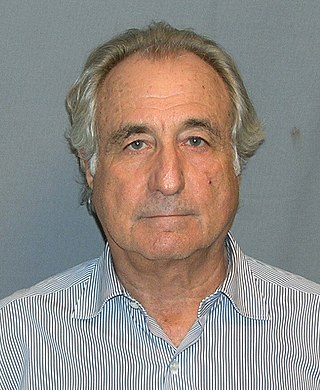Related Research Articles

A Ponzi scheme is a form of fraud that lures investors and pays profits to earlier investors with funds from more recent investors. Named after Italian businessman Charles Ponzi, this type of scheme misleads investors by either falsely suggesting that profits are derived from legitimate business activities, or by exaggerating the extent and profitability of the legitimate business activities, leveraging new investments to fabricate or supplement these profits. A Ponzi scheme can maintain the illusion of a sustainable business as long as investors continue to contribute new funds, and as long as most of the investors do not demand full repayment or lose faith in the non-existent assets they are purported to own.

The U.S. Securities and Exchange Commission (SEC) is an independent agency of the United States federal government, created in the aftermath of the Wall Street Crash of 1929. The primary purpose of the SEC is to enforce the law against market manipulation.

Pump and dump (P&D) is a form of securities fraud that involves artificially inflating the price of an owned stock through false and misleading positive statements (pump), in order to sell the cheaply purchased stock at a higher price (dump). Once the operators of the scheme "dump" (sell) their overvalued shares, the price falls and investors lose their money. This is most common with small-cap cryptocurrencies and very small corporations/companies, i.e. "microcaps".
A binary option is a financial exotic option in which the payoff is either some fixed monetary amount or nothing at all. The two main types of binary options are the cash-or-nothing binary option and the asset-or-nothing binary option. The former pays some fixed amount of cash if the option expires in-the-money while the latter pays the value of the underlying security. They are also called all-or-nothing options, digital options, and fixed return options (FROs).
In business, a boiler room is an outbound call center selling questionable investments by telephone. It usually refers to a room where salespeople work using unfair, dishonest sales tactics, sometimes selling penny stocks or private placements or committing outright stock fraud. A common boiler room tactic is the use of falsified and bolstered information in combination with verified company-released information. The term is pejorative: it is often used to imply high-pressure sales tactics and, sometimes, poor working conditions.

Securities regulation in the United States is the field of U.S. law that covers transactions and other dealings with securities. The term is usually understood to include both federal and state-level regulation by governmental regulatory agencies, but sometimes may also encompass listing requirements of exchanges like the New York Stock Exchange and rules of self-regulatory organizations like the Financial Industry Regulatory Authority (FINRA).

The Kingdom of EnenKio is a claimed micronation near the Marshall Islands run by Robert Moore.
Securities fraud, also known as stock fraud and investment fraud, is a deceptive practice in the stock or commodities markets that induces investors to make purchase or sale decisions on the basis of false information. The setups are generally made to result in monetary gain for the deceivers, and generally result in unfair monetary losses for the investors. They are generally violating securities laws.
The Dominion of Melchizedek (DoM) is a micronation known for facilitating large scale banking fraud in many parts of the world during the 1990s and early 2000s.
New Utopia, officially the Principality of New Utopia, is a micronation claiming the Misteriosa Bank, an unclaimed undersea rise of land in the Caribbean Sea off the Cayman Islands where it is hoped to build structures raised up from the underwater land. It was first proclaimed on 13 April 1999 by American businessman Howard Turney, under the name Lazarus Long; the project has recently been revived.

Kathleen L. Casey is a former Republican commissioner of the U.S. Securities and Exchange Commission. She was appointed by President George W. Bush and sworn in on July 17, 2006. Her term expired in August 2011.

Bernard Lawrence Madoff was an American financial criminal and financier who was the admitted mastermind of the largest known Ponzi scheme in history, worth an estimated $65 billion. He was at one time chairman of the Nasdaq stock exchange. Madoff's firm had two basic units: a stock brokerage and an asset management business; the Ponzi scheme was centered in the asset management business.

The Madoff investment scandal was a major case of stock and securities fraud discovered in late 2008. In December of that year, Bernie Madoff, the former Nasdaq chairman and founder of the Wall Street firm Bernard L. Madoff Investment Securities LLC, admitted that the wealth management arm of his business was an elaborate multi-billion-dollar Ponzi scheme.

Participants in the Madoff investment scandal included employees of Bernard Madoff's investment firm with specific knowledge of the Ponzi scheme, a three-person accounting firm that assembled his reports, and a network of feeder funds that invested their clients' money with Madoff while collecting significant fees. Madoff avoided most direct financial scrutiny by accepting investments only through these feeder funds, while obtaining false auditing statements for his firm. The liquidation trustee of Madoff's firm has implicated managers of the feeder funds for ignoring signs of Madoff's deception.
Laura Pendergest-Holt is a convicted Ponzi scheme perpetrator, financier, and former chief investment officer of Stanford Financial Group, who was charged with a civil charge of fraud on February 17, 2009. On May 12, 2009, Pendergest-Holt was indicted by a federal grand jury on two counts of a criminal complaint of obstructing a fraud investigation and conspiracy to obstruct justice. In early 2009, Stanford Financial became the subject of several fraud investigations, and on February 17, 2009, Pendergest-Holt was charged by the U.S. Securities and Exchange Commission with fraud and multiple violations of U.S. securities laws for alleged "massive ongoing fraud" involving $8 billion in certificates of deposit. The FBI raided three of Stanford's offices in Houston, Memphis, and Tupelo, Mississippi. On February 27, 2009, the SEC amended its complaint to describe the alleged fraud as a "massive Ponzi scheme". On June 21, 2012, she pleaded guilty to obstructing a U.S. Securities and Exchange Commission investigation into Stanford International Bank (SIB), the Antiguan offshore bank owned by Robert Allen Stanford. On September 13, 2012, Holt was sentenced to three years in prison, followed by three years of supervised probation. She was released on April 23, 2015.
Shana Diane Madoff, sometimes referred to as Shana Madoff Skoller Swanson, is an American former attorney who is now a yoga teacher.
Liu v. Securities and Exchange Commission, 591 U.S. 71 (2020), is a US Supreme Court case related to disgorgement awards sought by the Securities and Exchange Commission (SEC) for fraudulent activities. The Court ruled in an 8–1 decision that such disgorgement awards can be awarded by the courts as equitable relief under the Securities Act of 1933, , but they are limited to the wrongdoer's net profits and must be awarded for victims.
Mismarking in securities valuation takes place when the value that is assigned to securities does not reflect what the securities are actually worth, due to intentional fraudulent mispricing. Mismarking misleads investors and fund executives about how much the securities in a securities portfolio managed by a trader are worth, and thus misrepresents performance. When a trader engages in mismarking, it allows him to obtain a higher bonus from the financial firm for which he works, where his bonus is calculated by the performance of the securities portfolio that he is managing.
References
- ↑ "The Ruse That Roared". The Washington Post . 5 November 1995.
- 1 2 3 4 5 6 7 8 "Fantasy Island: The Strange Tale of Alleged Fraudster Pearlasia Gamboa". SF Weekly . 6 July 2011. Archived from the original on November 23, 2014.
- 1 2 "Weddings". Palo Alto Online . 15 November 2006.
- ↑ Tillman, Robert (2002). Global Pirates: Fraud in the Offshore Insurance Industry. Northeastern University Press. p. 112. ISBN 9781555535056.
- ↑ "Indiana trying to expel 'phantom' Asia Pacific Bank". The Indianapolis Star . 9 November 1994. p. E1.
- ↑ ""Nation" Waging "Spiritual War" on State Official". The Sacramento Bee . 13 February 1995. p. B1.
- ↑ "Cyber Nations with Real Repercussions". Asia Times Online . 17 Feb 2000. Archived from the original on December 12, 2013.
{{cite news}}: CS1 maint: unfit URL (link) - ↑ "Dominion of Melchizedek". Quatloos! .
- ↑ Tillman, Robert (2002). Global Pirates: Fraud in the Offshore Insurance Industry. Northeastern University Press. pp. 113–5. ISBN 9781555535056.
- 1 2 3 "SEC Ties Gold-Mining Shares to Empty Shell". Courthouse News Service . 15 Jun 2009. Archived from the original on March 19, 2012.
- ↑ "SEC Sues ZNext Mining and its Principal for Fraud and Registration Violations". U.S. Securities and Exchange Commission . 12 June 2009. Archived from the original on June 15, 2009.
- ↑ "U.S. ATTORNEY ANNOUNCES REGIONAL RESULTS OF "OPERATION BROKEN TRUST" TARGETING INVESTMENT FRAUD". United States Department of Justice . 6 December 2010. Archived from the original on January 21, 2011.